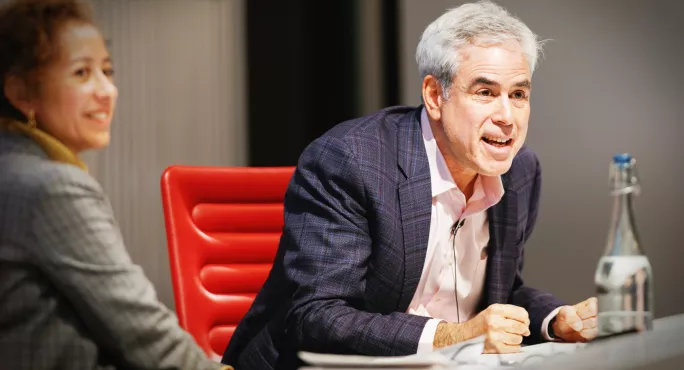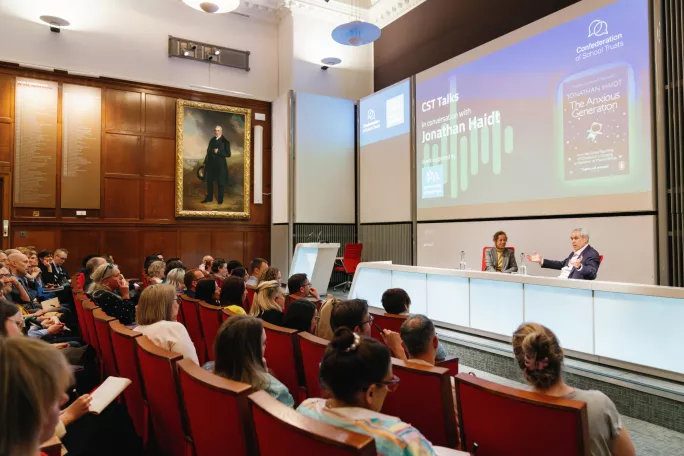
Jonathan Haidt: ŌĆśAnything you do digital in schools is worseŌĆÖ

ŌĆ£I get a lot of invitations to speak at schools and I say no to almost all of them, because I donŌĆÖt have time to do retail, to do one school at a time.ŌĆØ
That the American writer and academic Jonathan Haidt is in demand is no surprise: his agenda-setting polemic The Anxious Generation was already popular in the UK among those warning about the harms of social media and phones, but that popularity grew even further after the recent airing of the Netflix series Adolescence.
What he does still say yes to is talking to schools ŌĆ£at massive scaleŌĆØ, and so last week I joined a couple of hundred trust leaders at an event held by the Confederation of School Trusts (CST) to mark the paperback publication of The Anxious Generation. The assembled leaders, each clutching their paperback included in the ticket price, were ŌĆ£exactly the kind of audience that I want to reach nowŌĆØ, Haidt said.
Alongside being the Thomas Cooley Professor of Ethical Leadership at the New York University Stern School of Business, Haidt is an author of books that have shaken up the mainstream, including the bestselling The Coddling of the American Mind (2018), which argued that parental overprotection is harming young people. The Anxious Generation, which was published last year, has spent 52 consecutive weeks in the New York Times bestseller charts.
Phones and teenagersŌĆÖ mental health
In his CST address, Haidt laid out four key proposals: for children not to have access to smartphones or iPads before the age of 14, not to have access to social media before the age of 16, for all schools to be phone-free and for children to be given more independence to play in the real world.
To effect this change, he needs influential people on-side.
And for the most part, these audience members were. They nodded, murmured in agreement and sighed with a mixture of recognition and despair as he ran through a damning set of statistics that, he argued, showed how teenage mental health has declined as societyŌĆÖs dependence on smartphones has rocketed.
Haidt said the Covid-19 pandemic, when young peopleŌĆÖs reliance on social media became ever more pronounced, brought this into focus. But, he added, it ŌĆ£wasnŌĆÖt really a cause. Covid was just something that confused usŌĆØ and prevented us from seeing that if you track the data back further, a spike in the number of cases of teenage anxiety, depression and self-harm emerged around 2013 - just when ŌĆ£everybody was trading their flip-phones for smartphonesŌĆØ.
- Research: Do phones, tablets and laptops really disrupt learning?
- Tech in schools: Two in five teachers say mobile phones can be a teaching tool
- Opinion: Why the DfE is getting it wrong with tech in schools
The impact, Haidt argued, came not just on teenagersŌĆÖ mental health but also on their ability to concentrate - and hence learn.
ŌĆ£Students go to the bathroom a lot more oftenŌĆØ during lesson time, he said, and not because theyŌĆÖre better hydrated than any generation before them - laughter emerged from the audience - but because, unable to focus, they seek an excuse to scroll through their phones and give their brains the dopamine hit they crave.
Haidt brought further words of warning. ŌĆ£The people who made this technology do not let their kids use it,ŌĆØ he said, referencing the Silicon Valley executives who send their children to Waldorf schools, where technology use is minimised. ŌĆ£They know what their products do to kids.ŌĆØ
The audience responded with murmurs of agreement and a palpable sense of fear - many of the crowd were parents, too.
The impact on schools
However, HaidtŌĆÖs claims and proposals have been stridently challenged by academics who are expert in the fields that The Anxious Generation touched upon. Indeed, such has been the strength of the rebuke to his book that Haidt has penned frequent defences of his position using his blog and articles.
Would this audience be as challenging?
During the question and answer session, a leader from a primary-only trust described how most of her pupils bring smartphones into school. Teachers lock them away, she said, but she knows many children are glued to them whenever theyŌĆÖre not in school.
ŌĆ£Is there any evidence that shows we still have a positive impact on how theyŌĆÖre developing?ŌĆØ she asked.

╠²
Haidt answered enthusiastically: ŌĆ£I can say with some confidence that itŌĆÖs going to be really helpful...To give them six hours a day away from the screen has got to be good for them.ŌĆØ
But he couldnŌĆÖt offer evidence to support his point.
ŌĆ£Do I know studies that can back that up? I donŌĆÖt, because the thing youŌĆÖre describing has only been going on for a year or two. There are a few schools that [locked up studentsŌĆÖ phones] before Covid, but we just donŌĆÖt know.ŌĆØ
WhatŌĆÖs more, Haidt said, ŌĆ£as long as schools are giving them computers, then it isnŌĆÖt really six hours a day off the screenŌĆØ.
Computers on desks ŌĆśhas to stopŌĆÖ
Haidt added that he is in support of removing computers from studentsŌĆÖ desks (a practice that is much more common in the US) because of what he has seen while teaching university students.
ŌĆ£I have come to the conclusion that if there is a computer on a 28-year-oldŌĆÖs desk, they canŌĆÖt learn well. And yet, all our seven-, eight-, nine-, 10- and 11-year-olds have a computer on the desk. This has to stop.ŌĆØ
What about practical tech usage? One audience member, an assistant headteacher, said his school is currently discussing whether students should log their homework online, rather than in a paper planner. What did Haidt think to that?
ŌĆ£The presumption should be that anything you do digital is worse than anything you do manual, unless thereŌĆÖs evidence to the contrary, and there will sometimes be. But start from the assumption that digital is worse,ŌĆØ he said.
HaidtŌĆÖs worldwide influence
It was a damning remark that would, if put into practice, totally upend teaching. If there were worries about what that would mean for teacher workload in particular, they would perhaps have grown when Haidt made clear that his influence on policy is broad and multi-national.
He has assisted politicians in Australia to push a social media ban for under-16s, which is due to come into effect in December, and the audience left under no illusions that he intends to - and may achieve - similar influence in Europe.
ŌĆ£I actually had a meeting with Macron,ŌĆØ he said, referencing the French president, and told the crowd that in the UK he recently had lunch with Russell Viner, the Department for EducationŌĆÖs chief scientific adviser.
It is not just the assembled guests at the CST event who are paying attention to Haidt. The world, it seems, is listening, too. The question for education is: should it be?
For the latest education news and analysis delivered every weekday morning, sign up for the Tes Daily newsletter
Want to keep reading for free?
Register with Tes and you can read five free articles every month, plus you'll have access to our range of award-winning newsletters.
Register with Tes and you can read five free articles every month, plus you'll have access to our range of award-winning newsletters.
Keep reading for just ┬Ż4.90 per month
You've reached your limit of free articles this month. Subscribe for ┬Ż4.90 per month for three months and get:
- Unlimited access to all Tes magazine content
- Exclusive subscriber-only stories
- Award-winning email newsletters
You've reached your limit of free articles this month. Subscribe for ┬Ż4.90 per month for three months and get:
- Unlimited access to all Tes magazine content
- Exclusive subscriber-only stories
- Award-winning email newsletters
topics in this article



